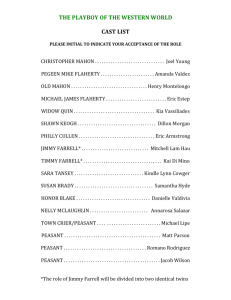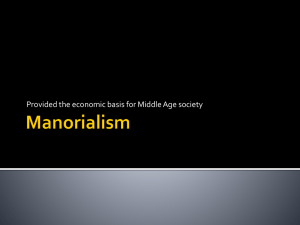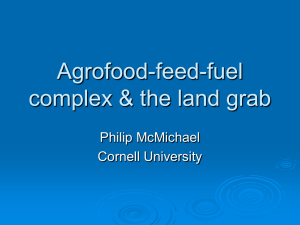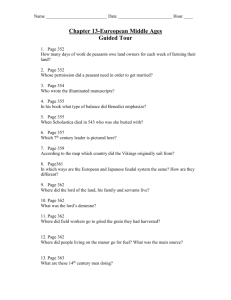Political Science 210: Peasant Politics (Spring 2013)
advertisement
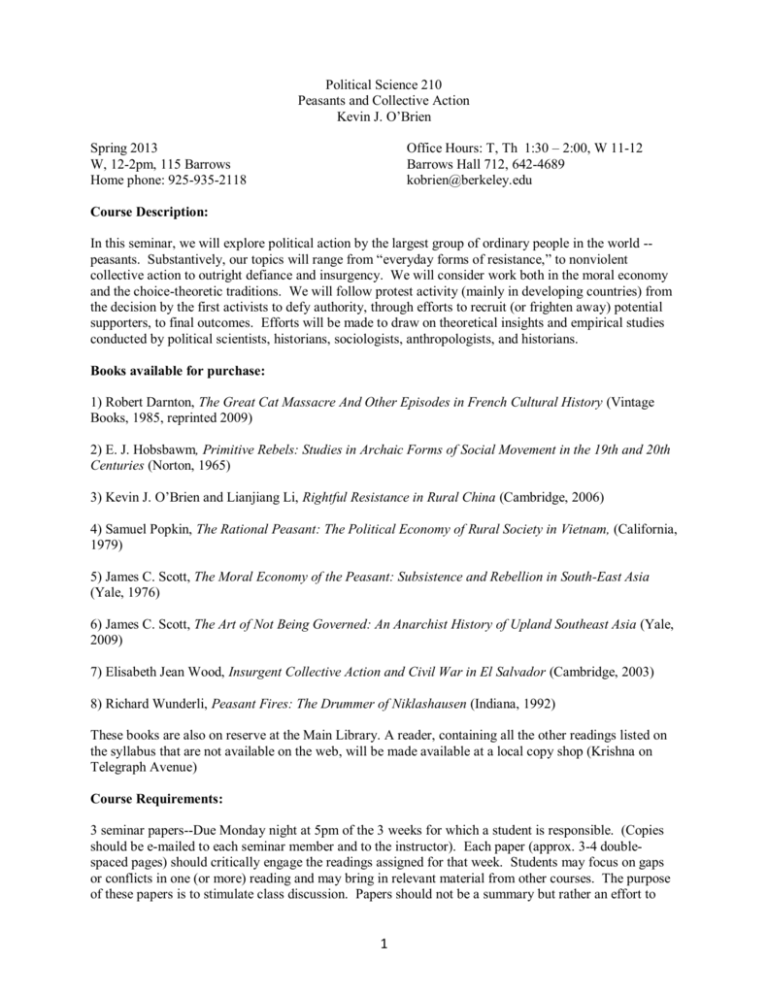
Political Science 210 Peasants and Collective Action Kevin J. O’Brien Office Hours: T, Th 1:30 – 2:00, W 11-12 Barrows Hall 712, 642-4689 kobrien@berkeley.edu Spring 2013 W, 12-2pm, 115 Barrows Home phone: 925-935-2118 Course Description: In this seminar, we will explore political action by the largest group of ordinary people in the world -peasants. Substantively, our topics will range from “everyday forms of resistance,” to nonviolent collective action to outright defiance and insurgency. We will consider work both in the moral economy and the choice-theoretic traditions. We will follow protest activity (mainly in developing countries) from the decision by the first activists to defy authority, through efforts to recruit (or frighten away) potential supporters, to final outcomes. Efforts will be made to draw on theoretical insights and empirical studies conducted by political scientists, historians, sociologists, anthropologists, and historians. Books available for purchase: 1) Robert Darnton, The Great Cat Massacre And Other Episodes in French Cultural History (Vintage Books, 1985, reprinted 2009) 2) E. J. Hobsbawm, Primitive Rebels: Studies in Archaic Forms of Social Movement in the 19th and 20th Centuries (Norton, 1965) 3) Kevin J. O’Brien and Lianjiang Li, Rightful Resistance in Rural China (Cambridge, 2006) 4) Samuel Popkin, The Rational Peasant: The Political Economy of Rural Society in Vietnam, (California, 1979) 5) James C. Scott, The Moral Economy of the Peasant: Subsistence and Rebellion in South-East Asia (Yale, 1976) 6) James C. Scott, The Art of Not Being Governed: An Anarchist History of Upland Southeast Asia (Yale, 2009) 7) Elisabeth Jean Wood, Insurgent Collective Action and Civil War in El Salvador (Cambridge, 2003) 8) Richard Wunderli, Peasant Fires: The Drummer of Niklashausen (Indiana, 1992) These books are also on reserve at the Main Library. A reader, containing all the other readings listed on the syllabus that are not available on the web, will be made available at a local copy shop (Krishna on Telegraph Avenue) Course Requirements: 3 seminar papers--Due Monday night at 5pm of the 3 weeks for which a student is responsible. (Copies should be e-mailed to each seminar member and to the instructor). Each paper (approx. 3-4 doublespaced pages) should critically engage the readings assigned for that week. Students may focus on gaps or conflicts in one (or more) reading and may bring in relevant material from other courses. The purpose of these papers is to stimulate class discussion. Papers should not be a summary but rather an effort to 1 highlight an important point, a methodological issue, and/or an assumption that underlies or permeates the reading(s). Efforts should be made to explore ways in which the reading relate to each other and how they help us improve our understanding of politics. During class, each author should be ready to answer questions about the papers and amplify points s/he raised. Hint: When preparing, pretend you are an overburdened student racing to figure out “why this book is so important” the night before your general exams. You might also consider how the readings speak to other areas of political science or peasant politics with which you are familiar (30% of course grade) 2 essays -- The instructor will distribute several essay questions near the end of the semester. Each student will choose two of these questions and will write two 8-10 page essays (2000-2500 words) to be handed in at the scheduled exam time. Most questions will require comparing and contrasting and will typically draw several readings together. Essays should not simply repeat or summarize the readings. Students are allowed (with the instructor’s permission) to replace the questions provided with questions of their own choice. Each essay will count for 20% of the student’s final course grade. Students may also, with the instructor’s permission, replace the final exam with a research paper on a suitable topic. (40% of final grade) OR 1 15-25 page research paper or a take-home essay exam (40% of final grade) Class participation--All students will be expected to participate in class discussions and to come to class prepared to consider the seminar papers for that week. (30% of course grade) January 23) Introduction and Ground Rules Part I – Classics January 30) Who are Peasants? How do Rural People Resist Power? E. J. Hobsbawm, Primitive Rebels: Studies in Archaic Forms of Social Movement in the 19th and 20th Centuries, Chapters 1-6 Marcus J. Kurtz, “Understanding Peasant Revolution: From Concept to Theory and Case,” Theory and Society 29 (2000): 93-124 (pay special attention to the various conceptualizations of the peasantry) (on web) Seminar Papers: 1) 2) 3) February 6) Rural Collective Violence: Competitive, Reactive, and Proactive Contention Charles Tilly, “Rural Collective Action in Modern Europe,” in Joseph Spielberg and Scott Whiteford, eds., Forging Nations: A Comparative View of Rural Ferment and Revolt, (Michigan State University Press, 1976), pp. 9-37. (an early statement of competitive, reactive, proactive scheme with rural examples) (in reader) Charles Tilly, “Contentious Repertoires in Great Britain, 1758-1834,” Social Science History Vol. 17, No. 2 (Summer 1993): 253-80. (moving away from competitive, reactive, proactive classification scheme and defending attention to “repertoires”) (on web) 2 William H. Sewell Jr., “Collective Violence and Collective Loyalties in France: Why the French Revolution Made a Difference,” Politics and Society, Vol. 18, No. 4 (1990): 527-52. (a critique of Tilly’s lack of interest in culture and a call for attention to events rather than “anonymous social forces”) (on web) Elizabeth J. Perry, “Rural Violence in Socialist China,” China Quarterly, No. 103 (September 1985): 414-40. (applying the competitive, reactive, proactive framework to one case) (on web) Seminar Papers: 1) 2) 3) February 13) The Moral Economy Perspective James C. Scott, The Moral Economy of the Peasant (entire but skim more empirical parts) Seminar Papers: 1) 2) 3) February 20) Rational Peasants? Samuel Popkin, The Rational Peasant: The Political Economy of Rural Society in Vietnam, Chapters 1, 2, 6 (read closely), Chapters 3, 4, 5 (read more quickly) Daniel Little, “The Moral Economy Debate,” in Understanding Peasant China (Yale, 1989), pp. 29-67 (in reader) Seminar Papers: 1) 2) 3) February 27) Everyday Resistance James C. Scott, “Everyday Forms of Resistance,” in Forrest D. Colburn, ed. Everyday Forms of Peasant Resistance, (M.E. Sharpe, 1989), pp. 3-33 (in reader) Benedict J. Tria Kerkvliet, “Everyday Politics in Peasant Societies (and Ours),” Journal of Peasant Studies, Vol. 36, No. 1 (January 2009): 227-43 (on web) K. Sivamakrishnan, “Some Intellectual Genealogies for the Concept of Everyday Resistance,” American Anthropologist, Vol. 107, No. 3 (2005): 346-55 (on web) Empirical Studies (focus on theory over details of specific cases): Robert Fletcher, “What are we Fighting For? Rethinking Resistance in a Pewenche Community in Chile,” Journal of Peasant Studies, Vol. 28, No. 3 (April 2001): 37-66 (in reader) Dipankar Gupta, “Everyday Resistance or Routine Repression? Exaggeration as a Stratagem in Agrarian Conflict,” Journal of Peasant Studies, Vol. 29, No. 1 (October 2001): 89-108 (in reader) Peter Vandergeest, “Constructing Thailand: Regulation, Everyday Resistance, and Citizenship,” Comparative Studies in Society and History, Vol. 35, No. 1 (January 1993): 133-58 (on web) Seminar Papers: 3 1) 2) 3) March 6) Interpreting Peasant Tales and Popular Rituals Robert Darnton, The Great Cat Massacre And Other Episodes in French Cultural History, pp. 3-106. Seminar Papers: 1) 2) 3) Part II – New Approaches and Empirical Studies March 13) Transnational Agrarian Movements and Globalization Special Issue of Journal of Agrarian Change, Vol. 7, Nos. 2 and 3 (April and July 2008): 169-514 (focus on the approach and theory, work through empirics quickly) (on web) Seminar Papers: 1) 2) 3) March 20) Power Without Organization: Chinese and Vietnamese Peasants and De-Collectivization Daniel Kelliher, Peasant Power in China, (Yale, 1992), Chapters 2 and 9 (in reader) Joseph Fewsmith, “The Emergence of Rural Reform,” in Dilemmas of Reform in China, (M.E. Sharpe, 1994), pp. 19-55 (in reader) Lucien Bianco, ”Weak Weapons,” China Perspectives no. 22 (March-April 1999): 4-16 (in reader) David Zweig, “Rural People, the Politicians, and Power,” China Journal 38 (July 1997): 153-68 (on web) Benedict J. Tria Kerkvliet, “Village-State Relations in Vietnam: The Effect of Everyday Politics on Decollectivization,” Journal of Asian Studies 54:2 (May 1995): 396-418 (on web) Seminar Papers: 1) 2) 3) March 27, Spring Break April 3) Rightful Resistance Kevin J. O’Brien and Lianjiang Li, Rightful Resistance in Rural China (Cambridge, 2006) (entire) Kevin J. O’Brien, “Rightful Resistance Revisited,” Journal of Peasant Studies, forthcoming (in reader) Susan Brandstadter, Review of Rightful Resistance in Rural China, Journal of Peasant Studies, Vol. 33 (2006): 710-12 (in reader); other reviews also available in China Quarterly, Mobilization, Perspectives in Politics, Contemporary Sociology, Political Studies Review, Review of Politics, Journal of Asian Studies, China Information, Copenhagen Journal of Asian Studies, China Perspectives, East Asia, China Journal etc. (on web) 4 Seminar Papers: 1) 2) 3) April 10) No Class (Instructor Overseas) April 17) Civil War Elisabeth Jean Wood, Insurgent Collective Action and Civil War in El Salvador (Cambridge, 2003) (entire, but work through empirical sections quickly) Seminar Papers: 1) 2) 3) April 24) Peasant Resistance and Religion Richard Wunderli, Peasant Fires (entire) Seminar Papers: 1) 2) 3) May 1) Statelessness James C. Scott, The Art of Not Being Governed: An Anarchist History of Upland Southeast Asia (Yale, 2009) , chapters 1, 5, 6, 8, 9 Seminar Papers: 1) 2) 3) May 15, noon – Take-Home Exam or Research Paper Due! E-Mail To Instructor 5


